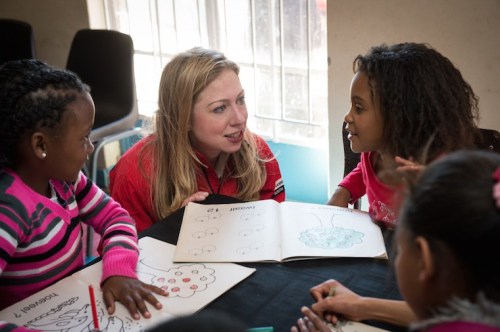Our editors independently select these products. Making a purchase through our links may earn Well+Good a commission
Chelsea Clinton: Why we need to talk about menstruation and breastfeeding
Chelsea Clinton explains, in her own words, why the taboo around menstruation and breastfeeding is hurting women—and how to change that.

A passionate advocate for girls and women worldwide who campaigned hard for her mother in the 2016 election, Chelsea Clinton is Vice Chair of the Clinton Foundation, an adjunct professor at Columbia University’s Mailman School of Public Health, an author, and mom to Charlotte and Aidan (whom she’s still breastfeeding).
When it comes to girls and women around the world, we know what the obvious obstacles are: lack of access to education, gender-based violence, child marriage, just to name a few. But some of the least discussed yet most pervasive barriers to women’s equality are topics that, for some, are uncomfortable to talk about—but ones that have to be brought into the open and addressed.
Too often, in too many places, we don’t support girls and women who are menstruating and mothers who are breastfeeding.
We need to talk about menstruation more to erase the stigma and the access barriers that too often go hand-in-hand with “that time of the month.”
Unfortunately, breastfeeding and menstruation remain fraught with cultural stigma, both here in the US and around the globe. Far too many girls and boys alike are socialized to think these are shameful topics—only to be discussed with our family and doctors, and we’re certainly not supposed to let anyone else see us dealing with them.
Remember how awkward you felt in school each time you carried a tampon or pad to the bathroom? Did you haul your whole backpack into the stall with you, like I did? For many girls and women around the world, there are no safe, sanitary stalls to use, and no pads or tampons. But, when was the last time you heard menstruation talked about in a conversation about economic development? Or economic justice? In a conversation about health care in the developing world or health care for refugees? Or in a conversation about education here in the US?
We need to talk about menstruation more and support menstruating girls and women of all ages to erase the stigma and the access barriers that too often go hand-in-hand with “that time of the month.”

In case it’s not clear why we need to talk about menstruation more: The average woman menstruates for 3,000 days in her lifetime, and far too many girls and women don’t have access to clean and safe sanitary products. According to UNICEF, one out of every ten girls in Africa misses school when she’s menstruating because she doesn’t have access to pads or clean water to wash them after use. That means the girls confront the fear of embarrassment monthly—and are missing school every month.
The average woman menstruates for 3,000 days in her lifetime.
Menstruation shouldn’t stop education—and with access to safe period products and clean water, girls would have one less barrier to gender equality. And this isn’t just a problem in the developing world. In America, tampons and pads aren’t covered by food stamps despite the fact that sanitary products are among the most requested items at food pantries and homeless shelters.
Indeed, pads and tampons are often an unaffordable luxury for families living in poverty—even though they’re not a luxury, they’re a necessity. Food stamps should cover sanitary products, and all states should recognize them as “necessities” (like food and medicine) and stop taxing them as luxury items.

Breastfeeding is another area that too often is treated with a cringe or even silence. After I gave birth to both my children, I spent a lot of time thinking about and planning how to breastfeed and how to pump once I went back to work. I know I’m very lucky. I could afford to buy a pump and have some control over my schedule of work at the Foundation, my writing, and teaching at Columbia (and advocating on behalf of my mom in her campaign last year when I took Aidan with me starting when he was five weeks old).
I have my own office at the Foundation and there’s a dedicated breastfeeding/pumping room at Columbia near the classroom where I lecture. I’ve also breastfed just about everywhere you could imagine and I’ve pumped in countless airport bathrooms, Amtrak train bathrooms, in quasi-public areas with my husband standing guard, and outdoors hidden behind a building when there were no other options.
I’ve pumped in countless airport bathrooms, Amtrak train bathrooms, in quasi-public areas with my husband standing guard, and outdoors hidden behind a building when there were no other options.
Sometimes I mistimed feeding or pumping and I could feel the milk leak out and soak the pads in my bra—and yes, I was lucky because I could afford disposable pads so I could at least know the leakage wouldn’t be visible as I was standing on a stage, sitting in a meeting, giving an interview, or reading a story to Charlotte (though that would have been a teachable moment). Do you feel awkward reading this? I hope not—and if you do, I hope you’ll think about why.
Many women cannot afford to buy or rent a pump, have inflexible work schedules, have to go back to work after just days or weeks of giving birth, and have no access to even a shred of privacy in which to pump at work. All of these challenges, coupled with the cultural stigma around breastfeeding (or pumping) in public, often lead women to choose to feed supplementary formulas or to stop breastfeeding their children altogether—even when they want to continue breastfeeding.
No woman should feel like she has to breastfeed—and no woman should feel like she can’t breastfeed because the costs or logistics of doing so are prohibitive. A 2016 report from Women’s Health Issues found that only 40 percent of women had access to both break time and a private space for pumping milk, despite federal law requiring women be provided with both.

We’ve all seen the headlines of stories of women being bullied for breastfeeding, told to take it to the bathroom, or to leave the premises altogether. All of this despite reams of research on the benefits breastfeeding can provide to children and mothers alike. Again, this is not to say that breastfeeding is the right answer for everyone. The right answer is for all women to have the ability to make what we each think are the best choices for our families and ourselves.
The stigmatization of breastfeeding and menstruation is harming women, but the good news is that there’s a lot that can be done to confront the stigma and remove other barriers menstruating women and breastfeeding moms face.
We shouldn’t be embarrassed by breastfeeding or menstruation—but we should be ashamed that women are suffering in silence because too many people refuse to speak out.
At the Clinton Foundation, we’re working to improve health and wellness for women across America and around the world by talking candidly about the problems we face and supporting gender-equitable and supportive environments. The Foundation encourages robust family leave and supports lactating mothers through our own policies and operations, as well as through No Ceilings: The Full Participation Project and other initiatives. Additionally, we’ve also worked closely with global partners through prior CGI commitments to educate young girls on healthy menstrual management, provide them with reusable sanitary pads and cleaning supplies, and empower them to stay in school and on track for success.
We need to change the conversation, the practices, and the policies that too often punish women for being women—and prevent mothers from being the moms they want to be for their kids. We shouldn’t be embarrassed by breastfeeding or menstruation, but we should be ashamed that women are suffering in silence because too many people refuse to speak out.
Another woman working to de-stigmatize menstruation: The yogi behind the viral “period” video. And in case you needed a reminder, wellness and activism have always been intertwined—so go on, make a difference!
Sign Up for Our Daily Newsletter
Get all the latest in wellness, trends, food, fitness, beauty, and more delivered right to your inbox.
Got it, you've been added to our email list.










